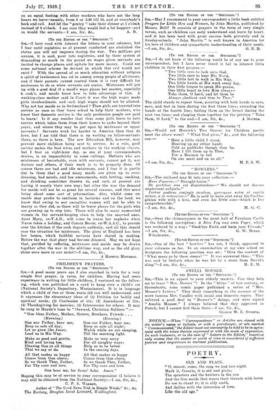[TO THE EDITOR OF THE " SPECEATOR."]
SIR,—I have read with interest the letters in your columns, but I fear until registries as at present conducted are abolished the status quo will not improve during the war. Two millions per annum, it is said, pour into registries, and by their system of demanding so much in the pound on wages given servants are incited to change places and agitate for more money. Could not some national scheme be devised in which this evil would not exist ? With the spread of so much education without religion a spirit of lawlessness has set in among young people of all classes, and if their parents cannot control them it is very difficult for mistresses to do so when servants are scarce. Mistresses will put up with a good deal if a maid's ways please her master, especially ti cook's, and maids know how to take advantage of this. A working-class mother said in Court it was the high wages made girls insubordinate, and such high wages should not be allowed. Why not tax maids as in Switzerland ? Then girls are hurried into service as soon as they leave school to. help their mothers, who know that domestic service is the only profession people are paid to learn! Is it any wonder that thus some girls learn to hate service which takes them from their homes to tasks beyond their years, and where they may be put upon by mistresses or upper servants ? Servants work far harder in America than they do here, but I am told that there is no waiting on fellow-servants there, as there is here. The new Education Bill, however, may prevent mere. children being sent to service. As a rule, good service makes the best wives and mothers in the working classes, but I fear an eight-hour day, as one of your correspondents desires, is an impossibility in some callings. Mothers who are mistresses of households, even with servants, cannot get it, nor doctors and others, if their work is to be properly done. Of course there are bad and idle mistresses, and I fear it is partly due to them that a good many maids are given up to over- dressing, bad novels, and low amusements, with betting, smoking, and drinking sometimes thrown in, and such at present are having it mostly their own way; but after the war the demand for maids will not be so great for several reasons, and this must bring about some sort of reformation. Also, whilst some ex- maids may prefer to continue in factories and on the land, we know that owing to our casualties women will not be able to marry as they did, so there will be fewer places for the girls who are growing up to step into. There will also be many unmarried women in the servant-keeping class to help the married ones. Aunt Mary, ex-V.A.D., will come to nurse her nephews when Nurse takes a holiday, and Cousin Bessie, ex-W.A.A.C., to preside over the kitchen if the cook departs suddenly, and all this should ease the situation for mistresses. The glory of England has been her homes, which faithful servants have shared in making. Before the war that glory had become dimmed. May we not hope that, purified by suffering, mistresses and maids may be drawn together after the war in the old-time way, and so the old glory shine once more in our midst ?—I am, Sir, &c., A HOPEFUL MISTRESS.


































 Previous page
Previous page